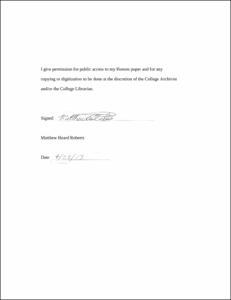Please use this identifier to cite or link to this item:
http://hdl.handle.net/10267/21102| Title: | Social support, but not neutral non-support, attenuates both stress and pain following a cold pain task: Evidence for the implementation of social support alongside medical treatment regimens |
| Authors: | Heard, Matthew Roberts |
| Keywords: | Text;Neuroscience;Honors papers;Text;Student research |
| Issue Date: | Apr-2014 |
| Publisher: | Memphis, Tenn. : Rhodes College |
| Abstract: | Social support has been demonstrated to attenuate pain and stress independently. The lack of a neutral non-support group to control for the effect of another person's presence on pain and stress reduction has made understanding the mechanisms of social support’s efficacy challenging. In particular, it is currently unknown whether it is merely the presence of another person in the room or the active social support that is responsible for producing anti-nociceptive effects. The current study examined the role of social support in the modulation of stress and pain following a cold pressor task. Following baseline rest, healthy female undergraduates underwent the pain task alone (n=25), or with a confederate in the room providing either no support (non-support condition; n=25) or verbal emotional support (support condition; n=26). Every 20 seconds during the pain task participants silently rated their pain levels on a visual analog scale (VAS). Immediately following completion of the task, participants separately rated the intensity and the unpleasantness of the pain with a VAS. Cardiovascular measures of heart rate (HR) and blood pressure (BP), as well as subjective ratings of mood and anxiety, were assessed both at baseline and immediately following the pain task. Results indicated that participants in the support condition had attenuated delta (stress minus baseline) systolic BP and delta HR, responses to the pain task, and also reported less overall pain, pain intensity, and pain unpleasantness compared to both control conditions. A post-task assessment revealed that participants in the support condition reported less task difficulty, tension, and effort than both control groups. No group differences in delta subjective ratings of affect or anxiety were found. This study is the first to demonstrate that social support, not simply the presence of another person, attenuates both pain and cardiovascular stress in response to a laboratory pain task. Given the negative effects of stress on health and treatment outcome, these findings bear significant clinical implications for the incorporation of activesocial support into painful medical procedures and standard pain treatment regimens. |
| Description: | Permission has been provided by the author to publish this paper. The paper was submitted on a CD to the Archives. |
| URI: | http://hdl.handle.net/10267/21102 |
| Appears in Collections: | Honors Papers |
Files in This Item:
| File | Description | Size | Format | |
|---|---|---|---|---|
| roberts_matthew_honors_complete.pdf | 533.82 kB | Adobe PDF |  View/Open |
Items in DSpace are protected by copyright, with all rights reserved, unless otherwise indicated.